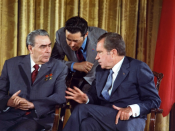Analysis of Seven Days in May
Full of indirect references of the United States government during the time of the Cold War, the film, Seven Days in May, is an excellent example of the problems arising within the government and the people during the time of this war. The film displays the lack of confidence in the President, the agreements made by the United States to the Soviet Union, the lack of trust the Americans had in the Soviets, and the moves made by the United States to protect the country.
In the film, the president appeared to be much less affluent than his generals when it comes to the way the United States perceives the government. General Scott was looked on with more value because he influenced the nation to perceive that he was on their side, and that he had the same ideals as the American people did.
His superb talent to speak in front of audiences led the people to respect Scott's ways. The president, on the other hand, was making deals with the Soviet Union that the Americans did not agree with. They were beginning to look upon him with less favor and more disagreement with his policies. When the president in the movie requested General Scott's recognition, this was much like when President Truman fired General MacArthur. Despite MacArthur's accomplishments in defeating the Chinese in many battles of the Cold War, President Truman was unhappy with him. MacArthur was disobeying his boss' commands, ultimately leading to his termination from his duties in the war. At this news, the American people were very upset, even though MacArthur was lawfully the one creating a problem.Pp. 777-778
During the movie, the President signed an agreement with the Soviets to disarm their navy completely, despite what...


